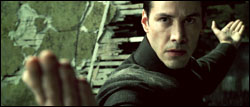Like a snake devouring itself, or perhaps like a computer virus endlessly replicating, there is no possible conclusion to The Matrix Revolutions (which opens Wednesday, Nov. 5, at the Meridian and other theaters). After the audaciously fresh 1999 original (the scales come off), after May’s dull Reloaded (Neo treads water), the Wachowski brothers obviously planned an ending, but it’s a false ending, a ploy. The brothers intend for you to leave the theater satisfied (a goal generally accomplished), but they also want you to discuss what it all means forever (bull’s-eye). True to its video game-comic book-martial arts-“Whoa, dude” philosophical underpinnings, the franchise is going to have a very long afterlife. Each chase or fight scene in Revolutions, like the freeway free-for-all in Reloaded, anticipates a PlayStation spin-off. There will be novelizations and comics, cartoons and anime, ancillaries for eternity, all of it as if to mock Agent Smith when he asks, in an uncharacteristic moment of doubt, “Is it over?”
If you’re looking for a human touch to this VR, machine-tooled, CGI-boosted fantasia, Smith’s your man. Even if he’s only playing a rogue program bent on destroying both mankind and the machines, Hugo Weaving’s sneer and drawl have all the flair and verve that the entire Wachowski cycle so generally lacks. More typical are Morpheus (Laurence Fishburne) and his fellow defenders of Zion, who remain locked in solemnity and/or munificence. Trinity (Carrie-Ann Moss) is a mere leather-wrapped action figure, and the supporting players are like a multiracial Benetton ad with Uzisall unraveling sweaters, toned flesh, and expressions of dour virtue. And Keanu? I feel sorry for him, having to carry on his shoulders the weight of two worldsreal and simulated. It’s bad enough that he and everyone else wear those shades all the time; here he has to mourn a friend’s death while blindfolded! (Why not just put him in a burlap bag?)
Yet there are moments when the movie really comes to lifechiefly owing to its effects. The swarm of tentacled, squidlike robot “sentinels” invading subterranean Zion swoosh and swirl like schools of flying fish. The firepower from Zion’s defense batteries is like a thousand World War II films being projected on the same screen at once. It’s like we’re aboard a war-flick bomber or sub, with everyone rushing through hatches, putting out fires, downing enemy fliers, and demanding more ammunition, more ammunition! This is Revolutions at its best. If some say it’s just like a video gamewell, what’s wrong with that? I’ve never seen a video game this cool.
BUT JUST WHEN the momentum gets going, groan, we’re off to see the Oracle again. Or, worse, it’s time for another ponderous deliberation with Zion’s ruling councillike C-SPAN with tattoos and dreadlocks. Neo and Trinity continue to profess their love for each other, but we got that idea in Reloaded, and this time there’s not any sex. (Nor is there another all-Zion rave, thank God.) The Wachowskis take every opportunity to flog their theme of free will versus determinism, but the movie feels endlessly heavy and overdetermined, not free at all. A thousand Internet chat rooms surely had Neo pegged as a Christ figure the day the first Matrix opened, so his ultimate fate is hardly surprising after so many foreshadowings.
As if sharing my impatience with all this talk, Trinity spits out, “I don’t have time for this shit,” before triggering a brawl against the supercilious Merovingian (Lambert Wilson) and his Eurotrash gang of latex-clad Helmut Newton disco-fetish goons. Upside-down shoot-outs on the ceiling? Heywhy not? That’s the spirit that keeps Revolutions moving, and it does keep moving despite its many longueurs. I dreaded a three-hour marathon of mumbo jumbo and kickboxing, but the film runs a fairly brisk 129 minutes. Look hard enough, and there are even a couple laughs. Trinity calls the Merovingian “Merv,” and Neo later walks into a classic Buster Keaton-style sight gag while trapped in a white subway station purgatory between the matrix and reality.
Although it feels like every word of Revolutions‘ script is capitalized, the portentousness does dissipate enough to make the movie enjoyable. It’s a lot better than Reloaded, and all movies benefit from regular time checks to annihilation. (“Red-eyed robot squid arrive in 10 minutes, sir!”) If Neo emerged blinkingly in Matrix part one as if from Plato’s cave, his eyes unaccustomed to the gloom of harsh reality, emerging from the theater here will give viewers something of the same dizzying sensation. Real or imagined, it’s a real work of imagination. Just don’t go expecting The Matrix Revelations.








